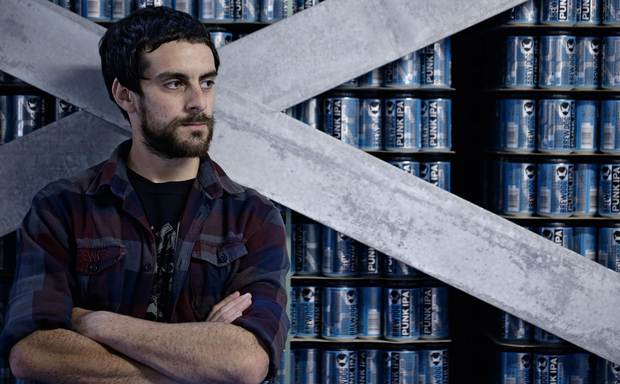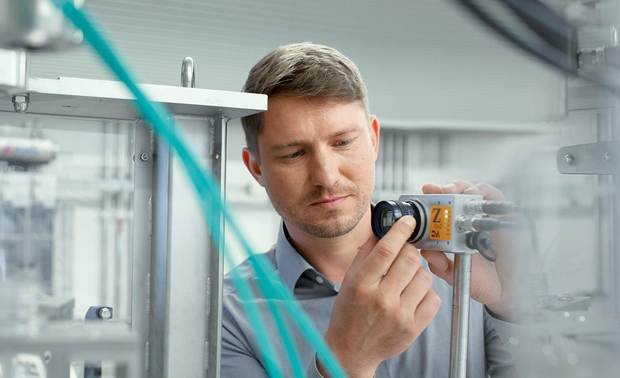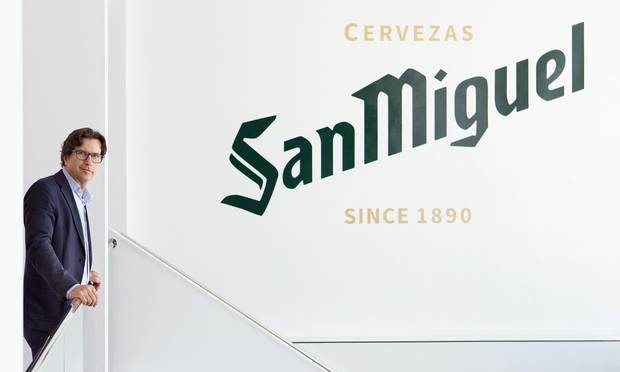Even if the best-before date on beer bottles suggests otherwise, beer doesn’t spoil. Gerold Tandler, head of Product Management Process Technology at KHS in Bad Kreuznach, Germany, is one man who is convinced of this. “Beer simply changes. After a while, haze substances and small lumps often thought to be yeast form. In fact, these are primarily compounds of polyphenols* and proteins. They form large agglomerates that precipitate in the bottle and then become visible.” This is something the consumer doesn’t find very appetizing. Beer destined for sale abroad, for instance, and which has be transported longer distances or stored therefore has to be stabilized.
*Polyphenols: aromatic compounds, for example, as bioactive secondary plant ingredients made of malt and hops.
Environmentally friendly system
KHS’ Innopro ECOSTAB product line offers regenerative stabilization using polyvinylpolypyrrolidone** (PVPP) for this purpose. In this process, turbidity-forming polyphenols are removed from the beverage. First, a configurable dosing pump doses PVPP into the product line. The beer is then stabilized in a small module where the PVPP is retained by the bound tannin molecules, resulting in short mixing phases, low media consumption and safe and reliable production. After stabilization the PVPP is regenerated in the modules, returned to the dosage tank and reused in the next stabilization cycles. This environmentally friendly system considerably improves the use of raw materials.
**Polyvinylpolypyrrolidone: food additive (E 1202) used as a technical additive in the beverage industry.
To date, this technology was intended for large and medium-sized breweries: developed for continuous stabilization, the Innopro ECOSTAB C with a capacity of 150 to 600 hectoliters per hour is ideal for companies with an output of more than 400,000 hectoliters per year. The Innopro ECOSTAB B stabilizes between 50 and 240 hectoliters per hour in batch operation and is thus a suitable choice for companies with annual outputs of 50,000 hectoliters or more.
»Everything needed to stabilize the beer is mounted on wheels.«
Compact stabilization
This KHS technology is also highly relevant for many smaller brewers with a yearly yield of between 10,000 and 70,000 hectoliters or breweries that only want to stabilize a small part of their production. “In the southeastern part of Bavaria where I come from, for example, there are a large number of companies of this kind,” says Tandler. “The majority of their production is sold in the vicinity of the brewery and consumed within a short time. These breweries export some of their beer, however – such as to Italy – which makes stabilization absolutely essential.”
With the Innopro ECOSTAB S KHS now offers these customers its tried-and-tested solution in a smaller size that’s affordable and easy to use. Thanks to its compact design and movable base the Innopro ECOSTAB S is mobile and can be flexibly integrated into the production process as required. Brewers can thus decide how much of their beer they wish to stabilize – and how much not. Milk pipe fittings are used to connect the machine. “Everything needed to stabilize the beer under constant conditions is located on the wheelbarrow,” emphasizes Tandler, revealing what the machine is jokingly referred to in Bad Kreuznach thanks to its design. No additional equipment is required and the simple and fully manual mode of operation eliminates the need for any integrated software.
And finally, thanks to its low media consumption and low procurement cost, which usually has a return on investment of less than two years, the machine is a highly attractive offer – even outside Bavaria.
Any questions on beer stabilization?
Gerold Tandler
KHS GmbH, Bad Kreuznach, Germany
Phone: +49 671 852 2283
Email: gerold.tandler@khs.com























